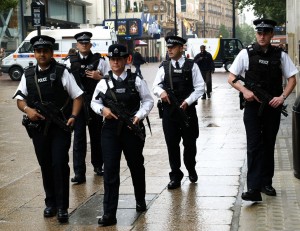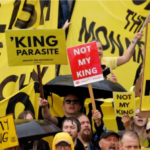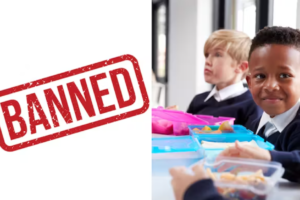As children we are taught to look up to the police, as a form of authority. Afterall, they are there to fight the “bad people” i.e, the criminals, who help to unleash terror on the rest of us.
Often, we are led to believe that the majority of police are there to serve and protect and help keep the public safe.
Well unfortunately, there are too many incidences in which this is not the case. Are the police here to serve and protect? And if so, who is it that they are serving or protecting?
When we hear of police subjecting people to public cavity searches or walking free from court after confessing to calling someone the n-word, it is not difficult to see why a growing number of black and asian people are wary of them.
Stop and search
Consider, the recent case of a young African-American boy who had his testicles ruptured by police during a routine stop and search.
Darren Manning was on his way home with a group of teammates from his high school’s basketball team, when they were apprehended by law enforcement officers.
Although some of his teammates ran away, Manning, a straight-A student with no previous criminal history or arrest records, decided to stop and cooperate.
That decision was later to prove damaging. It was then that he reported being roughly searched by a female officer, who then grabbed hold of his testicles and literally, ripped them apart.
Manning reported: “She patted me down, then she touched my butt and then my private parts, and then she grabbed and squeezed and pulled my private parts and I felt something pop.”
The force used was so violent that he then had to get surgery the next day. He was told that he may never be able to have children as a result.
Figures by Release reveal that if you’re from an ‘ethnic minority’ background, you’re up to seven times more likely to be stopped and searched by the police than if you’re white.
About a million stops take place each year – but only nine per cent lead to an arrest. Interestingly, even ethnic minorities who themselves work for the police report being singled out often by white officers, who sometimes refuse to believe who they are.
Last year, police officer Nick Glynn, 46 told the BBC that he had been stopped 30 times. He reported that it happened mostly when he was driving but also in the street. During one stop, he was even accused of using a fake identity card.
He described the incident as ’embarrassing and upsetting’ and said that he was given no explanation. By law, police officers are required to tell you why they have stopped you.
The European Court of Human Rights also outlawed stop and searches without reasonable suspicion, in 2010. This decision overruled an announcement by the coalition
government who pledged to make it easier for officers to stop and search on the basis of colour, when they first got into power.
Mr Glynn said he had been involved in designing new stop and search training for police officers, and explaining the effect it can have. He added that some of the officers he had trained had been members of the police for 20 years but had received no training in stop and search since joining the force.
In August, the Border Agency came under fire after it was revealed that they were stopping a disproportionately high amount of black and Asian people, as part of a campaign to crack down on illegal immigration.
It is cases like this which prompted home secretary Theresa May, to call for more transparency in the way these powers were being used.
She told parliament: “We shouldn’t rush to conclusions about those statistics, but everybody involved in policing has a duty to make sure that nobody is ever stopped just on the basis of their skin colour or ethnicity.”
On average, it takes a police officer 16 minutes to stop someone and process the details. That is 16 minutes of wasted time, and a delayed journey, for an innocent traveller who is stopped solely on the basis of colour.
Strip and cavity searches
If there is one thing worse than being frisked in the street, it is having a police officer demand that you take off all of your clothes, only then to stick their fingers inside you, without your consent.
This is rape by any other definition, and once again, ethnic minorities are more likely to be at the receiving end of this sexual interference. We are also seeing an increasing number of cases – across the world – where these type of invasive searches do not turn up any drugs.
In Texas, it was recently reported that two black women were stopped on the roadside, and subjected to cavity searches on the streets.
Brandy Hamilton, 26 and Alexandria Randle, 24 were made to submit to the searches after state trooper Nathaniel Turner claimed he could smell marijuana.
The police officer Jenny Bui who carried out the search failed to change her gloves at any point throughout.
In 2012, it was reported that 44 African-American men in Oakland, California, won a combined $5,850,000 in damages after being made to strip in public – sometimes in front of a passing crowd. As a result of the lawsuit, it was found that the Oakland police department had officially sanctioned public strip searches.
And in 2010 a Florida family were awarded $2 million in compensation after two female members of the family were made to undress completely in public and submit to a cavity search. They were also subject to racial abuse, after officers forced them to give the address of the family members they were visiting and conducted a raid of their home.
Not one police officer was fired after the incident. As a society, we need to question why these types of searches are even allowed in an age where we have X-Ray technology.
And when police officers are allowed to violate every piece of human rights legislation in existence by conducting them in public – often without good cause – then that will only serve to deepen the resentment against the police.
Deaths in custody
The recent verdict on the Mark Duggan case has helped to expose the ever growing gulf between the police and the black community.
When a young man is effectively executed in cold blood by the police – despite later reports demonstrating that he was not armed – then it is clear we have a very big problem on our hands.
Official figures showed that 15 people died at the hands of police last year. Over 1,000 people died in police custody over the last decade.
And yet not one police officer has been brought to task or convicted of a crime. The death penalty was abolished in 1969. And despite that, we have no accountability for the number of young men and women dying in police custody.
If we have a situation where some of young people have good reason to fear for their lives, or live in fear of sexual interference at the hands of authorities, then this will only serve to heighten resentment towards the police.
Racism
In 2012, 21-year-old Mauro Demetrio recorded PC PC Alex MacFarlane calling him a nigger. McFarlane was recorded as saying; “The problem with you is that you will always be a nigger … you will always have black skin colour … don’t hide behind your colour.”
MacFarlane was cleared of criminal racist abuse after two consecutive juries failed to reach a verdict. Prosecutors decided not to seek a third trial. MacFarlane’s defence against the charge was that he had used it in a misguided attempt to turn Demetrio’s life around.
It should also be noted that police officers were choking him at the time.
Despite laws which allegedly make it a crime to hurl racist abuse at someone, what we have here are police officers who flagrantly abuse this law, only to walk free from court afterwards.
The fact that a case so clear cut and well-evidenced can’t even see the police brought to justice defies belief – but not for inner city youth. There are many black and asian kids today who witness this type of behaviour from the authorities on an almost daily basis. To them, the total lack of accountability comes as no surprise. And until efforts are made to not only combat racism within the police – but also the public – then I’m afraid not only will the gulf between police and ethnic minorities continue to grow, but attempts to solve crime and turn kids away from gangs will also fail. We must ask ourselves; is this the kind of society we want? And if we are forced to accept this kind of behaviour as the norm, then what future does that create for young people growing up in today’s society?






















2 Comments